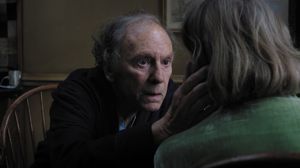For you, more than anyone, it must have been intimidating to work on a film by the director of The Piano Teacher (2001). However, it's possible he told you that showing an actor how to convincingly play the piano is a lot like directing someone how to fall in love on screen. You can go through the motions - staring down passionately at busy hands or swaying side-to-side in imagined euphoria - and then depend on carefully placed music and clever editing to create meaning. But the Kuleshov effect can only go so far; there's no substitute for a single well-placed medium shot that exposes a performer's true abilities. And piano or not, no director knows the power of a motionless, soul-exposing camera better than Michael Haneke.
Knowing and forgetting how to tickle the ivory is, however, of central importance to Amour. Two piano teachers, named George and Anne, like all Haneke duos, are in their twilight years when Anne has an unspecified medical emergency. Played with draining authenticity by Jean-Louis Trintignant and Emmanuel Riva, the two try to come to terms with Anne's medical condition, which emotionally transposes her into someone that George no longer recognizes.
This classification may sound a lot like Sarah Polley's Away From Her, but the two tales are certainly played in drastically different keys. However, Amour arguably relies upon the audience's familiarity with Haneke's directorial tendencies to truly appreciate this film's tension. As an auteur, he excels at playing every emotional note in a deceptive cadence before suddenly pounding out a beat of violence. These forte moments do occur in Amour, but their impact would certainly be less cathartic for to the untrained eye. In the same way your own job changes completely if an actor has no background in music, hooking an unfamiliar audience on the subtexts of Amour is a much bigger challenge
Still, the story is a very accessible drama, and the auteurish flourishes elevate the material. Long, steady wide shots, like that of an audience arriving at a piano recital are void of explicit meaning, and will either draw in cinematic connoisseurs rigorously scanning the screen for clues ,while leaving others impatiently wondering when the film will return to it's rhythm.
It eventually does, even if Haneke has no interest in finding a hook that will become the next big hit. And even so, the emotions certainly strike the right chord.
Taking a bow,
Christopher







